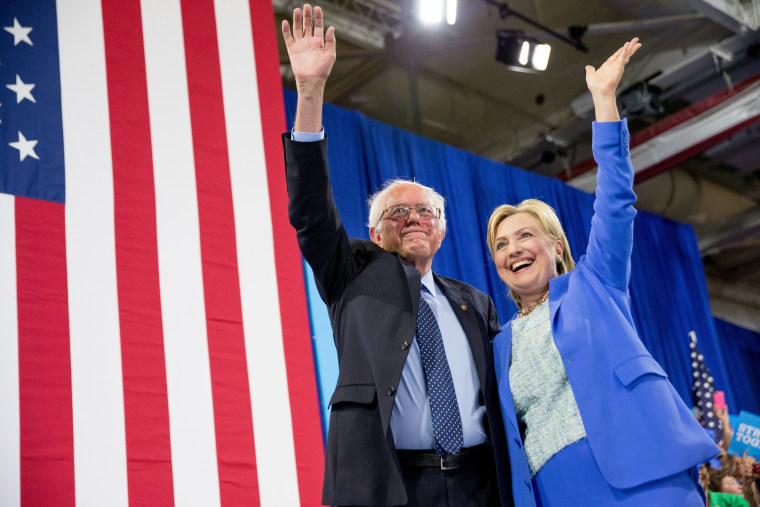An effort to eliminate superdelegates from the Democratic Party’s presidential nominating process is gaining some steam ahead of a meeting to consider changes to party rules, though supporters are currently well short of the votes needed to succeed.
Forty-three members of the party’s Rules Committee, which will meet Saturday in Philadelphia ahead of the Democratic National Convention, have signed on to an amendment to end superdelegates, organizers told NBC News. That's far from a majority of the 187-member committee, but enough to potentially force one final fight inside the party on the convention floor.
Superdelegates are elected officials and party dignitaries who can vote for the candidate of their choice at the convention. Superdelegates were created in the 1980s to serve as moderating influence on the party’s nominating process. Proponents say the system could, in an extreme case, help prevent the party from nominating someone destructive, noting the Republican Party had no similar mechanism to stop Donald Trump this year.
The superdelegate system has long been controversial and unpopular with the base, with detractors viewing it as an undemocratic way for party elites to exert their influence. They also say the superdelegates, who account for about 15 percent of nominating delegates, skew older, more male and whiter than the rest of the party.
“Whether superdelegates end up tipping the election or not, the mere existence of this system leads voters to the perception that the political system is rigged,” said Rhode Island state Rep. Aaron Regunberg, the amendment’s sponsor on the Rules Committee.
Related: Superdelegates Don't Determine the Democratic Nominee
Regunberg, like most vocal opponents of superdelegates this year, supported Bernie Sanders in the primary. Sanders blamed superdelegates, in part, for his loss, saying they had committed to Clinton before the nominating contests began and did not reflect the will of the voters in their states.
There was one flaw in that argument, however: Numerically, Hillary Clinton would still have won the nomination with pledged delegates even if super delegates were eliminated.
But the anti-superdelegate effort, led by a coalition of 14 outside groups, has also attracted some Clinton supporters who oppose the system on principle.
"Of all the ideas to reform and improve the nominating process of the Democratic Party, the core goal has to be to empower voices from the bottom up. The top-down idea of superdelegates is obsolete and is a good place to start,” said Democratic strategist Joe Trippi, who backed Clinton in the primary.
Simon Rosenberg, the president of the Clinton-wing think tank NDN, said superdelegates are a bad look for the party. "There are many reasons to end the practice of superdelegates in the Democratic Party. To me the most important is that it is discordant with broader and vital efforts by Democrats to modernize and improve our democracy,” he said.
This effort, which has also collected more than 80,000 petition signatures, is running in parallel to official negotiations between the Clinton and Sanders campaign, which are occurring behind closed doors.
Sanders officials prioritized efforts to influence the party platform, so outside activists stepped in on the rules portion.
Members of the Rules Committee are apportioned based on the outcome of the primaries, with about 40 percent appointed by Sanders and the remainder assigned by either Clinton or the DNC.
If anti-superdelegate activists fall short of a majority, they will almost certainly have enough support for a minority report, which would begin the process on a potential vote on the floor of the full Democratic Convention.
Sanders himself has ruled out floor fights on the party platform, but left the door open for ones on rules.
Activists think they might have a better chance among the rank-and-file delegates on the floor than those selected for the Rules Committee.
Clinton's exact position on superdelegates is unclear, but her campaign has asked allies on the committee not to submit resolutions or amendments, according to Politico, hoping to handle things quietly.
And eliminating superdelegates has been met with stiff opposition from the powerful Congressional Black Caucus, an awkward opponent for Sanders-aligned forces. The CBC argues the system allows elected officials to serve as delegates at the national convention without forcing them to run against constituents for the limited number of slots.
Compromises are also possible, which could include a decrease in the relative number of superdelegates, if not their elimination. Some Democrats have also floated the idea of reducing the number of caucuses, which favored Sanders, but are arguably less democratic than primaries.
Related: How Do Superdelegates Work? Here's What You Need to Know
Opponents of superdelegates note that an official party commission convened after the 2008 primary recommended the party do away with superdelegates.
The commission included former Obama campaign manager David Plouffe, Rep. James Clyburn and Sen. Claire McCaskill, all of whom are now staunch Clinton allies. (Clyburn agreed this year with the Congressional Black Caucus' pro-superdelegate position this year).
“Openness, fairness and accessibility are central to our ideals as Democrats, and the commission’s recommendations to reform the delegate selection process will ensure that voters’ voices and preferences are paramount to our process of nominating a Presidential candidate,” said then-DNC Chairman Tim Kaine, who is now thought to be the top contender to be Clinton’s vice presidential running mate.

